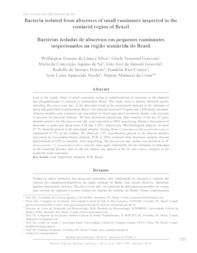Bacteria isolated from abscesses of small ruminants inspected in the semiarid region of Brazil.
Bacteria isolated from abscesses of small ruminants inspected in the semiarid region of Brazil.
Author(s): SILVA, W. E. de L. e; GOLVEIA, G. V.; SÁ, M. da C. A. de; GOUVEIA, J. J. de; PEIXOTO, R. de M.; RIET-CORREA, F.; VESCHI, J. L. A.; COSTA, M. M. da
Summary: Loss in the supply chain of small ruminants owing to condemnations of carcasses in the abattoirs and slaughterhouses is common in northeastern Brazil. This study aims to identify bacterial agents, including Mycobacterium spp., in the abscesses found in the postmortem analysis of the carcasses of sheep and goats bred in northeastern Brazil. Our analysis involved 679 goats and 1,838 sheep carcasses. Abscess samples were extracted and inoculated on blood agar and Lowenstein Jensen with pyruvate or glycerol for bacterial isolation. We then performed polymerase chain reaction of the hps 65 gene; samples positive for Mycobacterium spp. were subjected to DNA sequencing. Relative frequencies of abscesses in goats and sheep were 5.44 and 3.26%, respectively. Microbiological analysis revealed 87.7% bacterial growth in the inoculated samples. Among these, Corynebacterium pseudotuberculosisrepresented 67.7% of the isolates. We observed 1.9% mycobacteria growth in the abscess samples inoculated on Lowenstein-Jensen medium. PCR of DNA extracted from abscesses samples showed amplification of 0.9% of samples. After sequencing, Mycobacterium spp. isolate was identified as M. novocastrense. C. pseudotuberculosis was the main agent responsible for the formation of abscesses in the examined animals, and we did not identify any species of the M. tuberculosis complex in the examined small ruminants.
Publication year: 2016
Types of publication: Journal article
Unit: Embrapa Semi-arid Region
Keywords: Animal production, Bactéria, Cadeia produtiva, Caprino, Goat, Inspeção, Isolamento, Mycobacterium, Ovino, PCR, Produção animal, Sheep
Observation
Some of Embrapa's publications are published as ePub files. To read them, use or download one of the following free software options to your computer or mobile device. Android: Google Play Books; IOS: iBooks; Windows and Linux: Calibre.
Access other publications
Access the Agricultural Research Database (BDPA) to consult Embrapa's full library collection and records.
Visit Embrapa Bookstore to purchase books and other publications sold by Embrapa.

